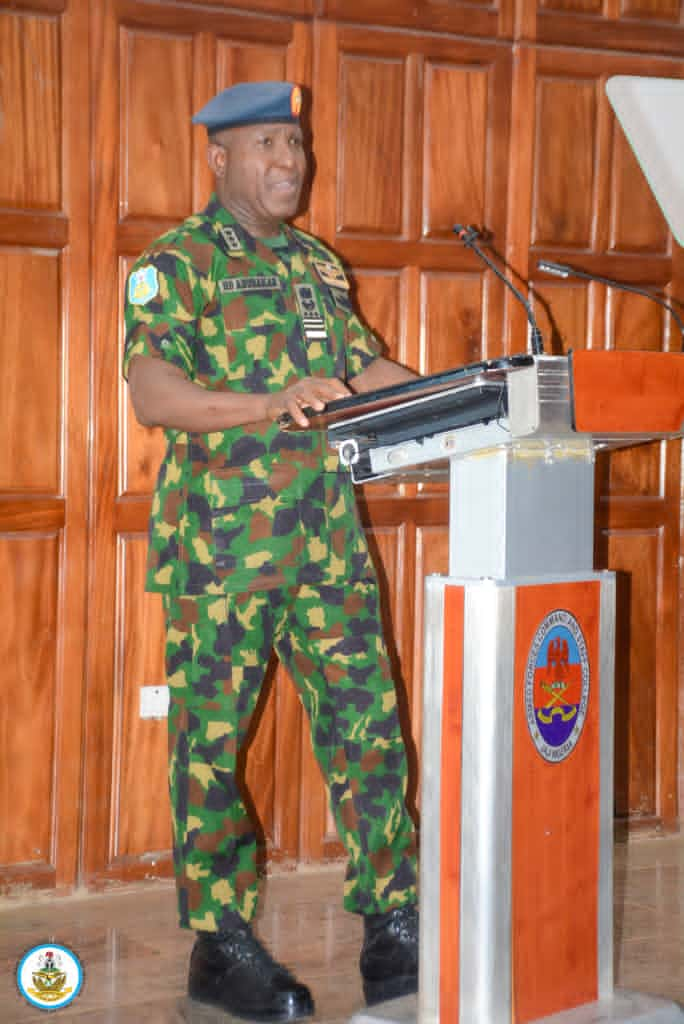By Bavoriat Clara
The Chief of the Air Staff (CAS), Air Marshal Hasan Bala Abubakar, has urged future commanders of the Armed Forces of Nigeria to lead with vision, serve with courage, and manage with integrity and prudence. He noted that these values are the foundation of effective leadership and the driving force behind institutional transformation.
In a statement by the Director of Public Relations and Information, Headquarters Nigerian Air Force, Air Commodore Ehimen Ejodame, the Air Chief gave the charge on 10 October 2025 while delivering a lecture titled “From Vision to Reality: Strategic Leadership Insights from the CAS Command Philosophy” to participants of the Senior and Junior Staff Courses at the Armed Forces Command and Staff College (AFCSC), Jaji.
Addressing the officers, Air Marshal Abubakar described leadership as the most decisive factor determining the success or failure of any organisation, declaring that “everything rises and falls on leadership.” He emphasized that the quality of leadership at all command levels directly affects morale, discipline, and combat effectiveness across the Services.
According to him, the transformation witnessed in the Nigerian Air Force (NAF) under his command is anchored on a leadership philosophy built around five key enablers — optimising force structure, mission-oriented training, proactive logistics and maintenance, prioritising research and development, and sustaining a highly motivated force through welfare and infrastructural renewal.
He explained that these enablers, guided by leadership by example, courage, and prudence, have strengthened the Service’s operational agility, resilience, and responsiveness across various theatres of operation. “Our Command Philosophy was not born out of chance but of deliberate vision and commitment to transforming the NAF into an agile and resilient force capable of meeting national security demands,” he stated.
Highlighting leadership by example, Air Marshal Abubakar revealed that he had undertaken over 40 operational visits covering 98 out of 99 NAF units nationwide within two years — visits he described not as ceremonial, but as deliberate acts of leadership presence aimed at inspiring troops and reinforcing accountability. “Leadership is about presence, not proximity,” he affirmed.
He also underscored courage as an indispensable quality of command, citing the 2023 Rukubi incident in Nasarawa State as an example of moral courage — the ability to confront difficult truths and take responsibility even under pressure. Rather than shift blame, he said, he chose to visit victims and implement reforms that birthed the Civilian Harm Mitigation and Response Action Plan, a framework that has since earned international recognition and contributed to the lifting of arms sale restrictions by the United States.
Under his leadership, the NAF has recorded significant strides in operational effectiveness, including the acquisition of 15 new aircraft and an additional 46 expected in the coming years. The Service has conducted over 3,000 sorties as of September and increased aircraft serviceability from 66 to 70 percent. He attributed these achievements to courageous reforms, visionary leadership, and prudent management of resources.
Air Marshal Abubakar further highlighted the establishment of new structures such as the Transformation and Innovation Branch, Directorate of Aircraft Life Cycle Management, and Directorate of Peace Support Operations as part of his vision to institutionalise efficiency, safety, and sustainability within the Service.
Charging the students to uphold courage, integrity, and conviction as hallmarks of command, the CAS remarked, “The true leader plants a tree whose shade he may never sit under, but under which others will find rest.” He urged the future commanders to translate vision into reality through exemplary conduct, moral courage, and prudent management. “If you hold fast to these ideals,” he concluded, “history will remember you not merely as officers who served, but as leaders who transformed.”
The lecture was followed by a lively interactive session, during which the CAS and the students engaged in candid discussions on leadership principles, operational challenges, and strategies for effective command and professional growth.
